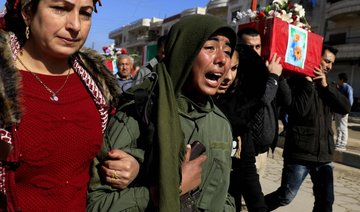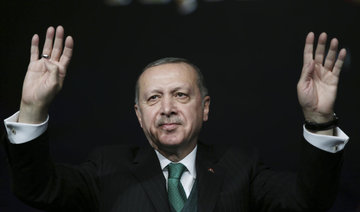ANKARA: Turkey has so far detained 573 people for social media posts and protests criticizing its military offensive in Syria, the government said on Monday.
The crackdown, which has extended to the national medical association, has deepened concerns about free speech under President Tayyip Erdogan, who has criticized opponents of the military intervention as “traitors.”
Turkey last month launched an air and ground offensive, dubbed Operation Olive Branch, against the Kurdish YPG militia in Syria’s northwestern Afrin region. Authorities have repeatedly warned they would prosecute those opposing, criticizing or misrepresenting the incursion.
“Since the start of Operation Olive Branch, 449 people have been detained for spreading terrorist propaganda on social media and 124 people detained for taking part in protest action,” the Interior Ministry said in a statement.
The operation has been widely supported by Turkey’s mainly pro-government media and by most political parties, with the exception of the pro-Kurdish opposition.
Last week, a prosecutor ordered the detention of 11 senior members of the Turkish Medical Association, including its chairman, after the organization criticized the incursion, saying: “No to war, peace immediately.”
Erdogan criticized the body as traitors. Detention orders were issued for another 13 people for supporting the medics.
Three of the doctors were later released on probation, according to the Hurriyet newspaper.
“There are laws that prohibit the glorification of terrorism, support for terrorism through propaganda and media. The prosecutors are implementing the laws,” Erdogan’s spokesman, Ibrahim Kalin, told reporters in Istanbul at the weekend.
Ankara considers the US-backed YPG, which controls Afrin, to be a terrorist group and an extension of the Kurdistan Workers Party (PKK) which has fought an insurgency in Turkey’s largely Kurdish southeast since 1984.
Turkey is in the midst of a widening crackdown that began after a failed coup attempt in July 2016. Some 50,000 people have been jailed and 150,000 sacked or suspended from their jobs.
Critics, including rights groups and some Western allies, say Erdogan is using the coup as a pretext to muzzle dissent. The latest arrests have also drawn criticism from the European Union.
Turkey says its measures are necessary due to the gravity of the security threats it faces.
Turkey detains nearly 600 for opposing Syrian offensive
Turkey detains nearly 600 for opposing Syrian offensive

Israel says intercepted missile launched from Yemen

- The Houthis, who control large parts of Yemen, have repeatedly fired missiles and drones at Israel since the war in Gaza
JERUSALEM: The Israeli military said Saturday it had intercepted a missile launched from Yemen, from where the Iran-backed Houthi rebels have launched multiple missile and drone attacks targeting Israel.
“Following the sirens that sounded recently in several areas in Israel, a missile that was launched from Yemen was intercepted” before “crossing into Israeli territory,“a military statement said.
The Houthis, who control large parts of Yemen, have repeatedly fired missiles and drones at Israel since the war in Gaza broke out in October 2023, in what they say is a show of solidarity with the Palestinians.
The rebels have also targeted ships they accuse of having ties to Israel as the freighters travel on the Red Sea — a vital waterway for global trade.
They paused their attacks during a recent two-month ceasefire in Gaza.
According to Israel’s army radio, the missile intercepted overnight was the 22nd fired by the Houthis since they had resumed their attacks as Israel renewed its Gaza offensive on March 18.
Since March 15, Israel’s key ally the United States has stepped up its attacks on the Houthis, targeting rebel positions in Yemen with near-daily air strikes.
Gaza rescuers say 4 dead, 30 missing under rubble after Israeli strike

GAZA: Gaza’s civil defense agency said an Israeli strike on Gaza City on Saturday killed four people and left “more than 30” feared buried under the rubble of a house.
“Our crews were able to recover four martyrs and five wounded following the attack,” said civil defense spokesman Mahmud Bassal, adding that “more than 30” people are presumed missing under the rubble and “our crews cannot reach them because of the lack of the necessary machinery.”
Missile launched from Yemen into Israel intercepted, Israeli army says

CAIRO: The Israeli army said in the early hours of Saturday that a missile that was launched from Yemen was intercepted before crossing into Israeli territory.
Sirens sounded in a number of areas in Israel following the launch, the Israeli army added in a statement.
There was no immediate comment from Yemen’s Iran-aligned Houthis, who have been launching attacks against Israel as well as ships they perceive as affiliated to Israel, in what they say is to support the Palestinians in Gaza against the Israeli offensive on the enclave.
Former Lebanese PM Diab questioned over Beirut port blast

- Investigation gains momentum as French official files transferred to Judge Tarek Bitar
- Lebanese President Aoun reiterates importance of judiciary in securing broader reform
BEIRUT: Former Lebanese Prime Minister Hassan Diab appeared before Judge Tarek Bitar on Friday for questioning related to the devastating Beirut port explosion of Aug. 4, 2020.
Diab was interrogated for two and a half hours before being remanded for further questions. The session came a week after Bitar questioned former Interior Minister Nohad Machnouk.
In recent weeks, former General Security Chief Maj. Gen. Abbas Ibrahim and former Head of State Security Maj. Gen. Tony Saliba also appeared before the judge.
The explosion devastated the capital’s waterfront, resulted in thousands of casualties, and has been compared in scale to a nuclear bomb.
It prompted widespread outrage both at home and abroad due to the long-term neglect in safely storing large quantities of ammonium nitrate at the port.
Diab, who was prime minister at the time of the explosion, had previously failed to attend hearings into the disaster for various reasons, notably claiming that “the investigative judge lacked jurisdiction to question” him, or stating that he was abroad.
For more than 18 months, several individuals contested their summons, arguing that Bitar was not the appropriate authority to investigate them.
They also initiated lawsuits against Bitar, whose work was suspended for a significant period due to political pressures and legal challenges.
During their unexpected appearances before the investigative judge, these individuals all expressed their intention to cooperate.
In Lebanon, political and judicial powers are intertwined, contrary to the constitution’s separation of powers principle.
The judiciary is mostly subject to political pressure, starting with judicial appointments, as with other institutions and administrations, which hinders reform efforts and the full independence of the judiciary.
A ministerial source told Arab News that President Joseph Aoun had always stressed two key pillars essential for the state’s recovery are security and the judiciary.
“The security appointments have been finalized, and measures are in place to restore security.
“The minister of justice and the High Judicial Council are actively working on judicial appointments to restore processes free from political interference and corruption.
“These procedures have started to affect the justice system, and everyone has begun to understand that the authority of the judiciary is not negotiable; the previously accepted method is no longer valid.”
The source emphasized that gaining political support for the judiciary is essential to shield it from interference.
This should be prioritized, particularly in light of the president’s commitment to maintaining judicial independence.
Additionally, Prime Minister Nawaf Salam is dedicated to implementing the ministerial statement that received unanimous support through the vote of confidence in his government, said the source.
Political authorities are still debating the law on judicial independence, but it remains unapproved and is currently stalled in joint parliamentary committees.
Aoun has previously stressed his belief in the judiciary as a cornerstone of reform.
In a recent meeting with the Bar Association, he noted that the challenge is not the coubtry’s laws themselves, but their implementation and accountability for violations.
“Too often, laws are interpreted for personal gain and interests. By working together, individuals committed to justice and accountability can address imbalances, fight corruption, and promote responsibility,” he said.
“Only the judiciary has the authority to deter offenders and corruption,” the president added.
Currently, the High Judicial Council is investigating bribery cases involving several judges and has issued a preliminary arrest warrant for one of them, who was arrested and transferred to the prison run by the General Directorate of Internal Security Forces.
The council recently set up three bodies to investigate cases against judges.
Lawyer Ghida Frangieh — who represents victims of the Beirut port explosion — told Arab News that the “renewed cooperation between the Public Prosecution and investigative Judge Bitar is a crucial development.
“It will help revive the port explosion case and allow the investigation to continue until an indictment is issued and, ultimately, a trial takes place,” Frangieh said.
“The election of the republic’s president, setting up a functional government instead of a caretaker government, and the political will for reform would collectively help reactivate Lebanon’s judicial system.
“This should have been the scenario in the port investigations three years ago, and all pending judicial cases should now be addressed and resolved in due order,” Frangieh added.
A French delegation is set to arrive in Beirut next Monday, following the transfer of judicial summons from the Public Prosecution at the Court of Cassation in Lebanon to France.
Bitar has requested access to French investigations regarding the port explosion, and the French judiciary has expressed willingness to support the judge by providing all necessary files and documents for his investigation.
Several French nationals were among those killed and injured in the Beirut port explosion.
US says blast near UNESCO world heritage site caused by Houthi missile

- A Houthi official was quoted by the New York Times as saying the American denial was an attempt to smear the Houthis
WASHINGTON: The US military said a blast on Sunday near a UNESCO world heritage site in Yemen’s capital city of Sanaa was caused by a Houthi missile and not an American airstrike.
The Houthi-run Health Ministry said a dozen people were killed in the US strike in a neighborhood of Sanaa. The Old City of Sanaa is a recognized UNESCO World Heritage Site.
The US ordered the intensification of strikes on Yemen last month, with officials saying they will continue assaulting Houthis until they stop attacking Red Sea shipping.
A US Central Command spokesperson said the damage and casualties described by Houthi officials “likely did occur,” but a US attack did not cause them.
The spokesperson said the closest US strike was more than 5 km away that night.
The US military assessed that the damage was caused by a “Houthi air defense missile” based on a review of “local reporting, including videos documenting Arabic writing on the missile’s fragments at the market,” the spokesperson said, adding the Houthis subsequently arrested Yemenis.
A Houthi official was quoted by the New York Times as saying the American denial was an attempt to smear the Houthis.
Recent US strikes have killed dozens, including 74 at an oil terminal on Thursday in what was the deadliest strike in Yemen under Trump so far, according to the local Health Ministry.
The US military says the strikes aim to cut off the Houthi militant group’s military and economic capabilities.
Rights advocates have raised concerns about civilian killings, and three Democratic senators, including Sen. Chris Van Hollen, wrote to Pentagon chief Pete Hegseth on Thursday, demanding an accounting for the loss of civilian lives.
The Houthis have taken control of swaths of Yemen over the past decade.
Since November 2023, they have launched drone and missile attacks on vessels in the Red Sea, saying they were targeting ships linked to Israel.




















